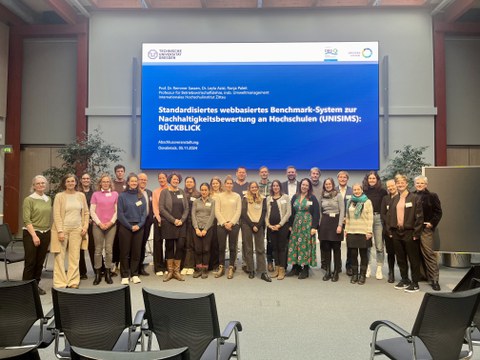Nov 25, 2024
Completion of UNISIMS project: A standard for sustainability indicators in universities
After three and a half years of intensive work, the UNISIMS team led by Prof Dr Remmer Sassen and Dr Leyla Azizi has reached an important milestone. Together with 25 pilot universities and 26 other interested institutions, the team has developed a 'University Sustainability Indicator Monitoring System', a standard for sustainability indicators in the areas of teaching, research, transfer, operations and governance.
The official closing event took place on 5 November 2024 on the premises of the German Federal Environmental Foundation (Deutsche Bundesstiftung Umwelt, DBU) in Osnabrück. Around 40 participants, including representatives of the pilot universities and interested universities, the DBU and other interested parties, took part in the event. Together, they looked back on the successes of the project and discussed the future of the developed indicator system.
The morning began with a welcome address by Verena Exner (DBU). Dr Leyla Azizi from the UNISIMS team then presented key results of the project and the methodological development of the indicators.
The dialogue between the participants already played a central role during the course of the project. This was also reflected in the final event: moderated discussion rounds were held on each of the five fields - teaching, research, transfer, operations and governance. These were led by the UNISIMS team together with Irmhild Brüggen (Leuphana University of Lüneburg), Christian Einsiedel (TH OWL), Annaliesa Hilger (Witten-Herdecke University), Dr Daniel Ketzer (Karlsruhe Institute of Technology), Jürgen Kopfmüller (Karlsruhe Institute of Technology), Lara Lütke-Spatz (Netzwerk Bayern) and Prof. Dr Marco Rieckmann (University of Vechta) and provided space for an intensive dialogue on the opportunities and challenges of the indicators developed.
The reports from the pilot universities were particularly valuable in demonstrating how the indicators can be used and implemented in practice. At the same time, important impulses for the further development and adaptation of the indicators were gathered.
A central aspect of the event was the question of the sustainability of the project itself. How can the indicators be established and further developed in the long term? The dialogue with the participants provided valuable input for future work on the project, will soon be transferred to the German Society for Sustainability at Universities (Deutsche Gesellschaft für Nachhaltigkeit an Hochschulen e.V. - DG HochN) in the near future.
The UNISIMS team would like to thank everyone involved for their committed participation and the fruitful discussions throughout the project. Special thanks go to the DBU for funding the project and for making the final event in Osnabrück possible.

